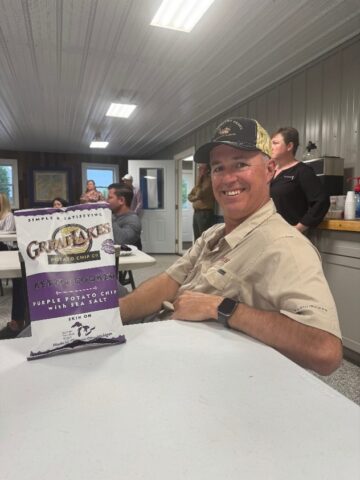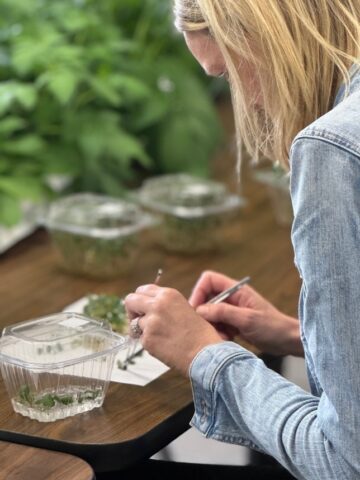Disclaimer: You are navigating to a website maintained by a third party and are about to leave the Potatoes USA website. The external link should not be considered an endorsement by Potatoes USA of the third-party website or the company or organization that owns it, and Potatoes USA is not responsible for the accuracy or nature of the content of the linked website.

Last month, the 2025-2026 executive committee headed to Michigan for this year’s outreach trip, visiting farms, packing sheds, and a potato chip plant to connect with members of our industry, learn about their challenges, and provide them with an update on how Potatoes USA is strengthening the demand for potatoes.
As Trever Belnap, Chair of the Communications Committee, put it, “These kinds of activities serve as a reminder that we really are all in this together and working in a fantastic industry!”
Starting strong, the first visit was to Great Lakes Potato Chips, which produced 15 million bags last year in their new plant, which they moved into two years ago for more space (and they’re already outgrowing). The plant was running, allowing the executive committee to see the hand-seasoned chips being produced. Ed and Chris Girrbach started the business in 2009, creating all the seasoning recipes themselves. Original is their most-sold flavor, but second is their local-favorite Michigan Cherry BBQ, which an unofficial poll shows was the favorite of the committee.

Committee Member Jess Blatchford enjoying Great Lakes Potato Chips
Next up was Iott Seed Farms, run by brothers Dennis and Greg Iott and their nephew Bryan Fischer. Bryan has been with the farm 13 years this August, and “we’ve spent ten years on a succession plan working towards Bryan being an owner and the next generation,” Dennis said. Farming in Kalkaska for 50 years (and southeast Michigan for 150), the Iotts grow a quarter of the seed grown in Michigan, shipping to almost everyone in the state who grows chipping potatoes, plus some farms in Indiana. They also grow six acres of Michigan State-developed variety Blackberry “just for fun” …and just for Great Lakes Potato Chips to make their beloved, limited run Purple Potato Chips every fall.

Dennis Iott giving a tour to the Executive Committee
Chris Iott, youngest brother of Dennis and Greg, runs the farm’s social media, helping to build their tight community. Additionally, ten years ago, Chris “got the itch” to make vodka. So now, he takes the farm’s surplus potatoes to Grand Traverse Distillery, where they get turned into vodka.
The next stop was Kitchen Farms, operated by fourth-generation Donald Kitchen and fifth-generation Dylan and Hailey, his kids, growing white, red, russet, yellow, and some mini potatoes. Theirs is a story of triumph; Kitchen Farms burned down in 2021, leaving nothing but the brick walls of the office. They were back up and running – with a shed more than twice the size of the original – in February 2023. “I drew a lot of [the new buildings] on bar napkins sitting in airports,” Donald said of the re-build. Kitchen relies on word-of-mouth marketing and strong relationships with buyers as their business continues to grow.
Sklarczyk Seed Farm’s mission is to provide peace of mind to their partners and deliver high-quality mini tubers while embracing sustainable practices that will benefit society and the surrounding environment. Listening to Ben and Alison Sklarczyk talk about their farm, staff, family, and the “many lives that depend on what we do here,” it’s clear that mission holds through everything they do. In addition to getting a peek at hydroponically grown mini-tubers almost ready for harvest, committee members learned how to cut plants with literal surgical tools, painstaking work that Alison and four other women do with impressive precision. “I learned from Ben’s mom; she taught me everything I know,” Alison shared.

Ben Sklarczyk

Wendy Alsum-Dykstra learning to cut plants at Sklarczyk Seed Farm
Over at Fresh Solutions Packing Shed, the committee saw potatoes being washed, graded, and packaged. Fresh Solutions, which ran its first crop through in 2009, has storage capacity for 10,000 tons and 22,600 square feet of climate-controlled shipping and cross-dock capacity. All of this allows Fresh Solutions Farms to better serve their midwestern customers…and beyond. “We’re feeding the world, right? All of us,” Terry Martin, General Manager, said as he concluded his tour for the committee.
The committee concluded their site visits at Midwest Water Stewards, where they learned how Todd and Jen Feenstra and their team are innovating ways to record water monitoring data, promote water stewardship, and protect water resources and rights. With proprietary tools and a deep commitment to agricultural stewardship, the team is a thoughtful, knowledgeable partner for local farms.
Finally, a highlight of the trip was dinner with several members of the local community. It was a chance for the committee to meet fellow industry members, learn more about their challenges, and encourage them to stay connected with Potatoes USA to be sure their voices are heard. It was also a chance to recognize David Douches, PhD, Director of Potato Breeding & Genetics at Michigan State University, for recently receiving the University Distinguished Professor Award. He’s one of only two plant breeders to be recognized with this award. Congratulations, David!
Thank you to Kelly Turner and Michigan Potatoes for helping organize such a meaningful trip, and to everyone who hosted the committee in Michigan!
